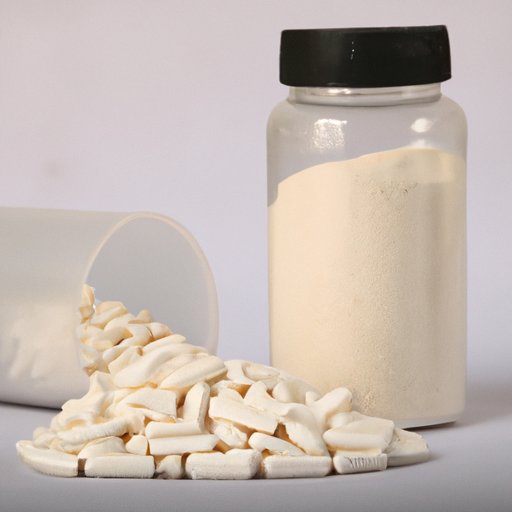

I. Introduction to the Importance of Protein Intake
Protein is an essential nutrient that is important for healthy growth and development in the body. It is a macronutrient that provides the building blocks for muscle, bone, skin, hair, and other tissues. Not only is protein important for physical health, but it also plays a crucial role in supporting mental health and overall well-being.
In order to maintain optimal health and fitness, it is important to ensure that you are getting an adequate amount of protein in your diet. However, calculating protein intake can be challenging, especially if you are unsure of your specific needs.
B. Explain why calculating protein intake is essential for optimal health
Calculating your protein intake is essential for optimal health because it helps to ensure that you are getting enough protein to support your body’s needs. Protein provides the amino acids that your body needs to repair and build tissue, and it is also important for maintaining a healthy immune system, producing hormones, and carrying out other critical functions.
Without enough protein in your diet, you may experience a range of health problems, including muscle loss, weakness, fatigue, and a weakened immune system. Additionally, if you are physically active or attempting to build muscle, getting enough protein is essential for achieving your fitness goals.
II. How to Calculate Your Daily Protein Needs: A Guide for Optimal Health
Whether you are an athlete, looking to lose weight, or just seeking to improve your overall health, calculating your daily protein needs is important. This guide will walk you through the basics of protein intake and provide step-by-step instructions for calculating the amount of protein you should be consuming on a daily basis.
A. Define the basic protein requirements for optimal health
The recommended daily allowance (RDA) for protein is 0.8 grams per kilogram of body weight for adults. However, this is a minimum requirement, and it may not be sufficient for individuals who are physically active or trying to build muscle.
Current research suggests that a higher protein intake may be more beneficial for individuals who are physically active or attempting to build muscle. Research shows that individuals who are physically active may require up to 1.6 grams of protein per kilogram of body weight to maintain muscle mass and support recovery.
B. Provide a step-by-step guide to calculating your daily protein needs
1. Body weight calculation
The first step in calculating your daily protein needs is to determine your body weight in kilograms. This can be done by dividing your weight in pounds by 2.2.
2. Physical activity level
The next step is to consider your physical activity level. If you are sedentary, you may need the minimum RDA of 0.8 grams of protein per kilogram of body weight. However, if you are physically active, you may require more protein to support recovery and muscle growth.
3. Age, gender, and other factors
Other factors that may influence your protein needs include your age, gender, and overall health status. Women, for example, may require slightly less protein than men due to differences in muscle mass and hormones.
C. Explain how to adjust protein intake according to your specific goals
If you are an athlete or bodybuilder, you may require more protein to support muscle growth and recovery. However, if you are trying to lose weight, you may need to balance your protein intake with a calorie-restricted diet to avoid overconsumption.
III. Simple Steps to Determine Your Protein Intake Based on Your Body Weight
A. Discuss the relevance of body weight in calculating protein intake
Body weight is an important factor in calculating protein intake because it provides a baseline for determining your overall protein needs. Generally speaking, the more you weigh, the more protein you will require to maintain muscle mass and support overall health.
B. Break down the calculation process into simple steps
1. Explain the rule of thumb method
A simple way to estimate your daily protein needs is to use the “rule of thumb” method. This involves multiplying your body weight in pounds by 0.36. For example, if you weigh 150 pounds, you would need approximately 54 grams of protein per day.
2. Discuss the gram per kilogram method
The gram per kilogram method involves multiplying your body weight in kilograms by a factor of 0.8 to 2.2, depending on your activity level. For example, if you are an athlete, you may require up to 2.2 grams of protein per kilogram of body weight.
3. Advise on adjusting protein intake for specific health needs
If you have specific health needs, such as a medical condition or food allergy, you may need to adjust your protein intake accordingly. This may involve working with a registered dietitian or healthcare provider to develop a personalized nutrition plan.
IV. The Importance of Protein and How to Calculate Your Daily Requirements
A. Reiterate the importance of protein for health and fitness
Protein is essential for optimal health and fitness and plays a critical role in supporting muscle growth, recovery, and overall well-being. Additionally, protein is important for maintaining a healthy immune system, producing hormones, and carrying out other vital functions in the body.
B. Elaborate on the calculation process and discuss specific factors such as age, gender, and physical activity levels
The calculation process for determining your daily protein needs involves considering a range of factors, including your body weight, activity level, age, and gender. By taking these factors into account, you can determine the optimal amount of protein to support your unique health and fitness goals.
C. Provide real-life examples to illustrate the importance of protein intake
Real-life examples of the importance of protein intake may include professional athletes who need a high protein diet to support muscle growth and recovery, or individuals who are recovering from an injury and require protein to support tissue repair.
V. Calculate Your Protein Intake: A Step-by-Step Guide to Reaching Your Fitness Goals
A. Explain how protein intake is relevant to fitness and weight loss
Protein intake is relevant to fitness and weight loss because it plays a crucial role in supporting muscle growth and recovery. Additionally, protein can help to reduce appetite and support a calorie-restricted diet, making it easier to achieve weight loss goals.
B. Provide a detailed guide to calculating protein intake for a variety of fitness goals such as:
1. Strength training
Individuals who engage in strength training may require up to 2.2 grams of protein per kilogram of body weight to support muscle growth and recovery.
2. Weight loss
For individuals who are looking to lose weight, it is important to balance protein intake with a calorie-restricted diet. Generally, protein should make up about 25% of total calories, with the rest coming from carbohydrates and healthy fats.
3. Cardiovascular training
Individuals who engage in cardiovascular training may require less protein than those who engage in strength training. However, protein is still important for supporting muscle recovery and overall health.
4. Bodybuilding
Bodybuilders may require significantly more protein to support muscle growth and recovery, with some individuals requiring up to 2.5 grams of protein per kilogram of body weight.
C. Discuss the importance of consistency and monitoring progress in protein intake
Consistency and monitoring progress are important when it comes to protein intake because they can help you to stay on track with your fitness goals and ensure that you are getting enough protein to support your needs. This may involve tracking your protein intake using a food journal or app, or working with a registered dietitian to develop a personalized nutrition plan.
VI. The Ultimate Guide to Protein Intake: Calculate Your Needs for Maximal Results
A. Wrap up the article by summarizing the key takeaways
Calculating your daily protein needs is an important part of maintaining optimal health and fitness. By taking into account your body weight, activity level, and other factors, you can determine the optimal amount of protein to support your unique needs.
B. Provide some additional tips on maximizing protein intake for optimal health and fitness
1. Meal planning
Meal planning can help you to stay on track with your protein intake and ensure that you are getting enough protein throughout the day. This may involve meal prepping or finding a protein powder that you enjoy.
2. Protein-rich foods
Adding protein-rich foods to your diet can help you to increase your protein intake and provide a range of other health benefits. Some examples of protein-rich foods include lean meats, fish, eggs, and legumes.
3. Supplements
If you are struggling to meet your protein needs through food alone, supplements such as whey protein or casein protein can help to provide an additional source of protein to support your fitness goals.
C. Encourage readers to make protein intake a priority for optimal health and fitness
Protein intake is an essential component of optimal health and fitness. By making protein intake a priority, you can support your body’s needs and achieve your fitness goals.
VII. From Strength Training to Weight Loss: How to Correctly Calculate Your Protein Intake.
A. Conclude the article by summarizing the importance of calculating protein intake for a range of fitness goals
Calculating protein intake is important for a range of fitness goals, including strength training, weight loss, and cardiovascular training. By taking into account your unique needs and goals, you can determine the optimal amount of protein to support your health and fitness.
B. Provide some final thoughts on optimizing protein intake based on individual needs and fitness goals
Optimizing protein intake is essential for achieving your fitness goals and supporting overall health. Whether you are an athlete, trying to lose weight, or just seeking to improve your health, calculating your protein needs can help to ensure that you are getting enough protein to support your unique needs.





